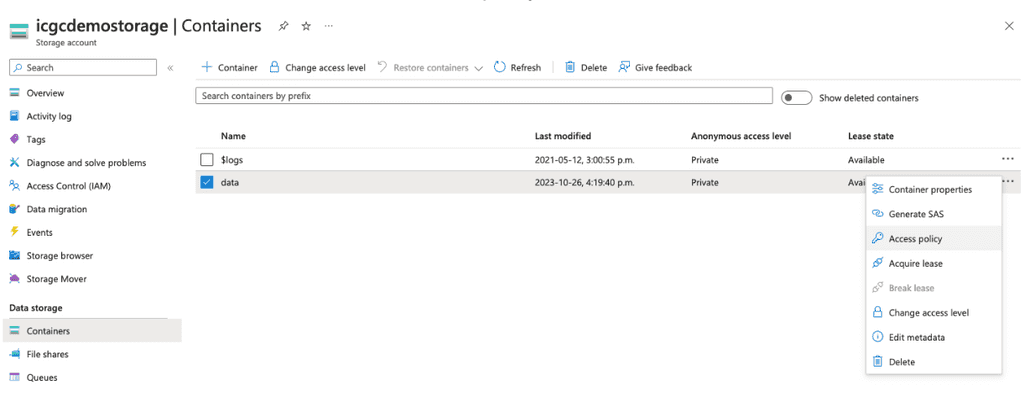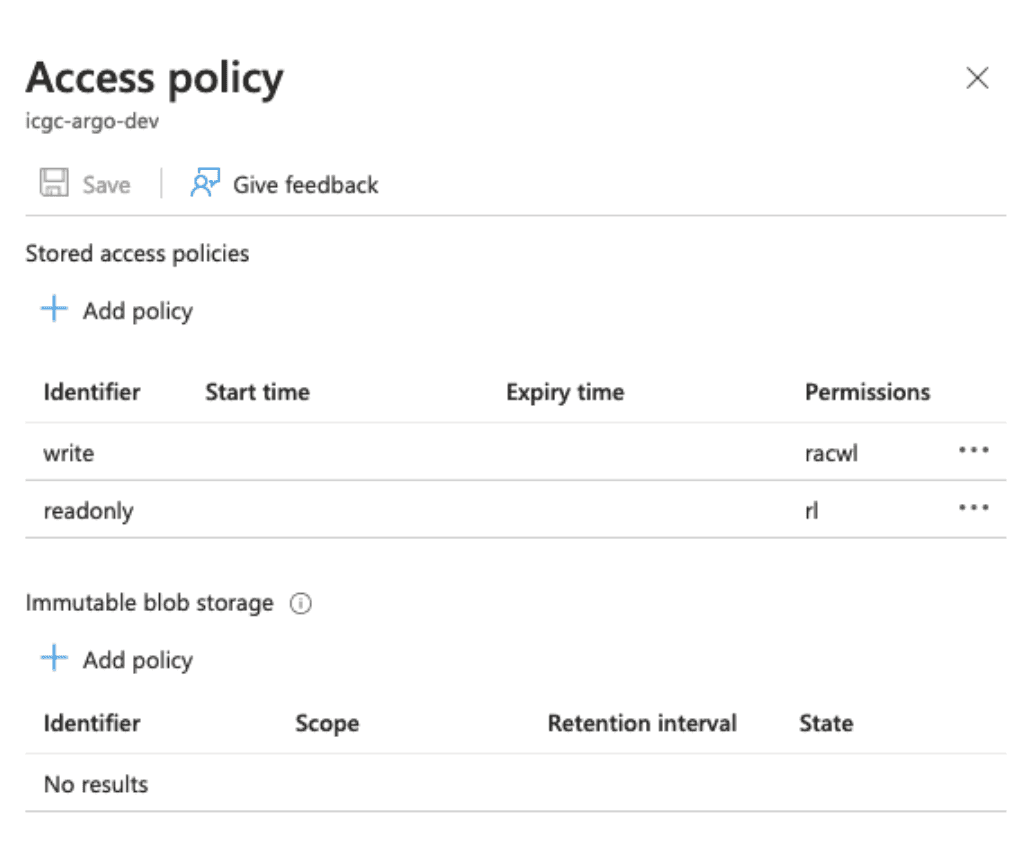Object Storage Integration
Storage Provider Setup
To set up your object storage for Score:
- Register with a provider of your choice and follow their instructions for setting up and configuring their service.
 Minio Local Quickstart
Minio Local Quickstart
If you'd like to quickly spin up a compatible object storage locally, you can run the following command: docker run --name minIO -p 9000:9000 -e MINIO_ACCESS_KEY=minio -e MINIO_SECRET_KEY=minio123 minio/minio:RELEASE.2018-05-11T00-29-24Z server /data
- Create two data buckets for Score to use:
- A bucket to store object data
- A bucket to store and maintain state information
Note: After creation, remember the IDs of both buckets, they will be required later for configuring Score.
- You may need to create a
/datasub-folder in advance for each bucket. This requirement will depend on your storage provider and is summarized below:
| Storage Provider | Data sub-folder required |
|---|---|
| Amazon S3 | No |
| Microsoft Azure | No |
| MinIO | No |
| OpenStack with Ceph | Yes |
- Record the URL, access key and secret key used to access your storage service. These will be required later for configuring Score. Keep these values safe and secure.
 For Amazon S3 buckets
For Amazon S3 buckets
Remember to document the geographical region where you have configured your buckets to be stored, this will be required when configuring Score.
Environment Variable Setup
Once your object storage is established, the next step involves configuring Score for connection. The specific configuration settings will vary based on your object storage provider. Below are the detailed setup instructions.
AWS, Ceph, or Minio
To connect Score with AWS, Ceph, or Minio storage, modify your .env.score file as follows:
# ============================# Object Storage Configruation Variables# ============================SPRING_PROFILES_ACTIVE=prod,awsS3_ENDPOINT="http://localhost:9000"S3_ACCESS_KEY="minio"S3_SECRETKEY="minio123"S3_SIGV4ENABLED="true"BUCKET_NAME_OBJECT="object.bucket"BUCKET_NAME_STATE="state.bucket"BUCKET_SIZE_POOL=0BUCKET_SIZE_KEY=2UPLOAD_PARTSIZE=1048576UPLOAD_RETRY_LIMIT=10UPLOAD_CONNECTION_TIMEOUT=60000UPLOAD_CLEAN_CRON="0 0 0 * * ?"UPLOAD_CLEAN_ENABLED="true"
The following table summarizes the necessary variables:
| Setting | Requirement | Description |
|---|---|---|
S3_ENDPOINT | Required | API endpoint URL of your storage service. Score will communicate with the service via this URL. |
S3_ACCESSKEY | Required | Access key for your object storage buckets. |
S3_SECRETKEY | Required | Secret key for your object storage buckets. |
S3_SIGV4ENABLED | Required | Set to true if using AWS S3 Signature Version 4 for authentication. Otherwise, set to false. |
BUCKET_NAME_OBJECT | Required | ID of the bucket for storing object data. |
BUCKET_NAME_STATE | Required | ID of the bucket for storing state information. |
BUCKET_SIZE_POOL | Required | DESCRIPTION |
BUCKET_SIZE_KEY | Required | DESCRIPTION |
UPLOAD_PARTSIZE | Required | Byte size of each upload chunk to the object storage. Adjust for performance. |
UPLOAD_RETRY_LIMIT | Required | Retry attempts for failed uploads before aborting. |
UPLOAD_CONNECTION_TIMEOUT | Required | Timeout duration in milliseconds for idle connections. |
UPLOAD_CLEAN_CRON | Optional | Schedule for the cleanup cron job, if enabled. |
UPLOAD_CLEAN_ENABLED | Optional | Set to true for enabling the cleanup cron job. |
Azure
For connecting Score with Azure storage, update .env.score as shown:
SPRING_PROFILES_ACTIVE=prod,azureAZURE_ENDPOINT_PROTOCOL=httpsAZURE_ACCOUNT_NAME={{storage_account_name}}AZURE_ACCOUNT_KEY={{storage_account_secret_key}}BUCKET_NAME_OBJECT={{object_bucket}} # Object data storage bucket/container nameBUCKET_POLICY_UPLOAD={{write_policy}} # Access policy name for write operationsBUCKET_POLICY_DOWNLOAD={{read_policy}} # Access policy name for read operationsUPLOAD_PARTSIZE=104587DOWNLOAD_PARTSIZE=250000000 # Default part size for downloadsOBJECT_SENTINEL=heliograph # Required sample object/file name for `ping` operations; default is `heliograph
The following table summarizes the Azure-specific variables:
| Setting | Requirement | Description |
|---|---|---|
AZURE_ENDPOINT_PROTOCOL | Required | Communication protocol for the Azure storage API endpoint (e.g., https). |
AZURE_ACCOUNT_NAME | Required | Account name for accessing Azure object storage. |
AZURE_ACCOUNT_KEY | Required | Account key for accessing Azure object storage. |
BUCKET_NAME_OBJECT | Required | Bucket ID for storing object data. |
BUCKET_POLICY_UPLOAD | Required | Access policy name for write operations. |
BUCKET_POLICY_DOWNLOAD | Required | Access policy name for read operations. |
UPLOAD_PARTSIZE | Required | Byte size of each upload chunk. Adjust for performance. |
DOWNLOAD_PARTSIZE | Required | Byte size of each download chunk. Adjust for performance. |
OBJECT_SENTINEL | Required | Default sample object/file name for ping operations. |
Access Policy Configuration for Azure
For Azure storage, you must define a storage access policy for your container.
Access the Azure dashboard: Select containers from the left-hand menu.
Locate your container: Choose
Access Policyfrom the dropdown menu.Create
writeandreadonlyaccess policies:
 Azure storage access policies
Azure storage access policies
For more information on Azure storage access policies, visit the official Azure storage services documentation.

